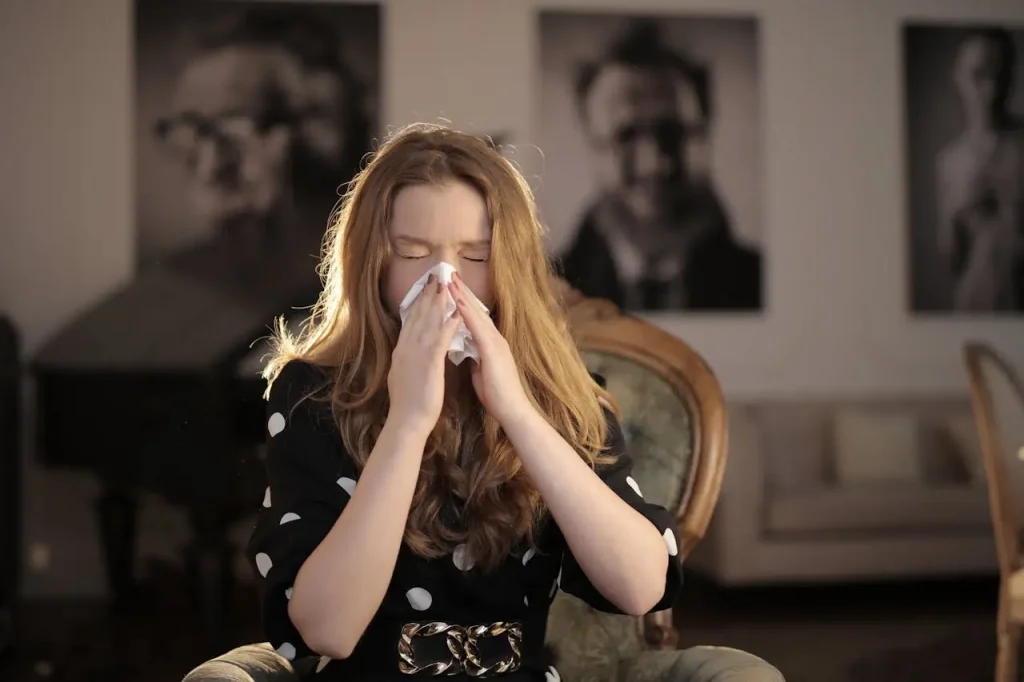The Complete Guide to Understanding Sneezing and Its Triggers

Sneezing: it’s a common reflex that can be triggered by a variety of factors, leaving us reaching for the tissues and wondering what just happened. In this comprehensive guide, we delve into the world of sneezing, exploring its causes, triggers, and how to find relief.
What is sneezing?
Sneezing is a natural reflex that occurs when the nasal passages are irritated. It is the body’s way of removing irritants and allergens from the nose. The process of sneezing involves a complex series of actions that begins with the stimulation of sensory nerves in the nasal lining. This triggers a signal to the brain, which then sends a message to the muscles responsible for the sneeze reflex. As a result, air is forcefully expelled through the nose and mouth, along with any irritants that may be present.
While sneezing is a normal bodily function, excessive sneezing or sneezing that is accompanied by other symptoms may indicate an underlying issue. Understanding the causes and triggers of sneezing can help you identify the source of your discomfort and take appropriate measures to find relief.
The science behind sneezing
To understand sneezing, it’s important to grasp the science behind this reflex. Sneezing is essentially a protective mechanism designed to keep our airways clear. When irritants such as dust, pollen, or pet dander enter the nasal passages, they can trigger the release of histamines and other chemicals. These substances cause the blood vessels in the nasal lining to dilate, leading to inflammation and congestion. In response, the body initiates a sneeze to expel these irritants and restore normal airflow.
The sneeze reflex is orchestrated by a combination of nerves and muscles. When the sensory nerves in the nasal lining detect an irritant, they send signals to the brainstem, specifically the medulla oblongata. This part of the brain coordinates the various muscles involved in sneezing, including those responsible for closing the vocal cords, contracting the diaphragm, and forcefully expelling air through the nose and mouth.
Common triggers of sneezing
Sneezing can be triggered by a wide array of factors, ranging from environmental irritants to underlying medical conditions. Understanding these triggers can help you identify the cause of your sneezing and take appropriate action. Some common triggers include:
- Allergies: Allergic reactions to substances such as pollen, dust mites, pet dander, and mold spores can cause sneezing. These allergens can stimulate the immune system, leading to the release of histamines and other chemicals that trigger sneezing.
- Viral infections: Sneezing is a common symptom of viral respiratory infections, such as the common cold or flu. When viruses invade the respiratory tract, they can irritate the nasal lining and stimulate sneezing as a defense mechanism.
- Environmental factors: Exposure to irritants like dust, smoke, strong odors, and chemicals can trigger sneezing. These irritants can stimulate the nasal lining and initiate the sneeze reflex.
- Medical conditions: Certain medical conditions, such as rhinitis, sinusitis, and nasal polyps, can cause chronic sneezing. These conditions often involve inflammation and congestion of the nasal passages, leading to frequent sneezing episodes.
Allergies and sneezing
Allergies are a common cause of sneezing, affecting millions of people worldwide. Allergic reactions occur when the immune system overreacts to harmless substances, perceiving them as threats. This triggers a release of histamines, which can cause inflammation and other symptoms, including sneezing.
Several types of allergies can cause sneezing, including:
- Seasonal allergies: Also known as hay fever or allergic rhinitis, seasonal allergies occur during certain times of the year when specific plants release pollen into the air. Common triggers include tree pollen in the spring, grass pollen in the summer, and weed pollen in the fall.
- Perennial allergies: Perennial allergies, on the other hand, are not seasonal and can occur year-round. They are often triggered by indoor allergens such as dust mites, pet dander, mold spores, and cockroach debris.
- Food allergies: While food allergies typically manifest as digestive symptoms, they can sometimes cause sneezing and other respiratory symptoms. Common food allergens include peanuts, tree nuts, shellfish, eggs, milk, and wheat.
If you suspect that your sneezing is caused by allergies, it’s important to consult with a healthcare professional for proper diagnosis and management. They can perform allergy tests to identify specific triggers and recommend appropriate treatment options, such as antihistamines, nasal sprays, or allergen immunotherapy.
Sneezing and viral infections
Sneezing is a common symptom of viral respiratory infections, such as the common cold or flu. When viruses invade the respiratory tract, they can irritate the nasal lining and trigger sneezing as a defensive response. Sneezing helps expel the virus particles from the body and reduces the risk of spreading the infection to others.
In addition to sneezing, viral infections may also cause other respiratory symptoms such as coughing, congestion, sore throat, and fever. These symptoms usually subside within a week or two as the body’s immune system fights off the infection.
To prevent the spread of viral infections, it’s important to practice good respiratory hygiene. This includes covering your mouth and nose with a tissue or your elbow when sneezing, washing your hands regularly, avoiding close contact with sick individuals, and staying home when you’re feeling unwell.
Sneezing and environmental factors
In addition to allergies and viral infections, sneezing can also be triggered by various environmental factors. These include:
- Dust: Dust particles can irritate the nasal passages and trigger sneezing, especially in individuals who are sensitive to dust mites or have allergic reactions to dust.
- Pollen: Pollen from trees, grasses, and weeds can cause seasonal allergies and sneezing in susceptible individuals. Pollen counts are often highest during the spring and fall seasons.
- Pet dander: Proteins found in pet dander, saliva, and urine can trigger allergic reactions in some people, leading to sneezing and other respiratory symptoms.
- Mold spores: Mold spores, commonly found in damp and humid environments, can also cause allergic reactions and sneezing.
To minimize exposure to these environmental triggers, it’s important to keep your living spaces clean and well-ventilated. Regular dusting, vacuuming, and air purifying can help reduce the number of allergens and irritants in your home. Additionally, keeping pets out of bedrooms and using dehumidifiers can help control pet dander and mold spores.
Sneezing and medical conditions
In some cases, chronic or excessive sneezing may be a symptom of an underlying medical condition. These conditions may involve inflammation, congestion, or structural abnormalities of the nasal passages. Some common conditions that can cause sneezing include:
- Rhinitis: Rhinitis is a condition characterized by inflammation of the nasal lining. It can be caused by allergies (allergic rhinitis) or non-allergic triggers such as irritants, infections, or hormonal changes.
- Sinusitis: Sinusitis refers to inflammation of the sinuses, which are air-filled cavities located around the nose and eyes. Chronic sinusitis can cause persistent sneezing, along with other symptoms such as facial pain, congestion, and postnasal drip.
- Nasal polyps: Nasal polyps are noncancerous growths that develop in the lining of the nasal passages or sinuses. They can obstruct airflow, leading to chronic sneezing, congestion, and difficulty breathing through the nose.
If you’re experiencing chronic sneezing or suspect an underlying medical condition, it’s important to consult with a healthcare professional. They can perform a thorough evaluation, including a physical examination and possibly imaging studies, to determine the cause of your symptoms. Treatment options may include medications, nasal sprays, or, in some cases, surgical intervention.
Home remedies to stop sneezing
While seeking medical advice is important for chronic or severe sneezing, some home remedies may help provide temporary relief for occasional sneezing episodes. These include:
- Nasal irrigation: Nasal irrigation involves flushing the nasal passages with a saline solution to remove irritants and allergens. This can be done using a neti pot or a nasal irrigation kit.
- Steam inhalation: Inhaling steam from a bowl of hot water or taking a hot shower can help moisten the nasal passages, soothe irritation, and provide temporary relief from sneezing.
- Avoiding triggers: If you know that certain substances or activities trigger your sneezing, try to avoid them as much as possible. For example, if you’re allergic to pollen, stay indoors during peak pollen times and keep windows closed.
- Maintaining a clean environment: Regularly cleaning your living spaces and minimizing exposure to dust, pet dander, and other allergens can help reduce sneezing episodes.
- Using over-the-counter remedies: Over-the-counter antihistamines, nasal sprays, and decongestants may provide temporary relief from sneezing. However, it’s important to read and follow the instructions carefully and consult with a healthcare professional if symptoms persist or worsen.
It’s worth noting that home remedies may not be effective for everyone, and their efficacy may vary depending on the underlying cause of sneezing. If your symptoms persist or worsen despite these measures, it’s important to consult with a healthcare professional for proper evaluation and guidance.
When to see a doctor for excessive sneezing
While occasional sneezing is normal, excessive or persistent sneezing may indicate an underlying issue that requires medical attention. It’s important to seek medical advice if:
- You’re experiencing chronic or recurrent sneezing that lasts for more than a few weeks.
- Your sneezing is accompanied by other symptoms such as congestion, runny nose, itching, or difficulty breathing.
- Your sneezing is interfering with your daily activities or quality of life.
- You’re unsure of the cause of your sneezing or suspect an underlying medical condition.
A healthcare professional can perform a thorough evaluation, including a physical examination, medical history review, and possibly allergy testing or imaging studies. Based on the findings, they can recommend appropriate treatment options or refer you to a specialist if needed.
Conclusion
Sneezing is a common reflex that can be triggered by various factors, from allergies and viral infections to environmental irritants and underlying medical conditions. Understanding the triggers behind your sneezing can help you manage and mitigate the discomfort. Whether it’s seasonal allergies, exposure to irritants, or an underlying medical condition, there are various treatment options available to provide relief.
If you’re experiencing chronic or excessive sneezing, it’s important to consult with a healthcare professional for proper evaluation and guidance. They can help identify the underlying cause of your sneezing and recommend appropriate treatment options to alleviate your symptoms.
So grab a tissue and take control of your sneezing. With the knowledge and resources provided in this complete guide, you can better understand the science behind sneezing, identify common triggers, and take steps to find relief. Don’t let sneezing hold you back from enjoying life to the fullest.


